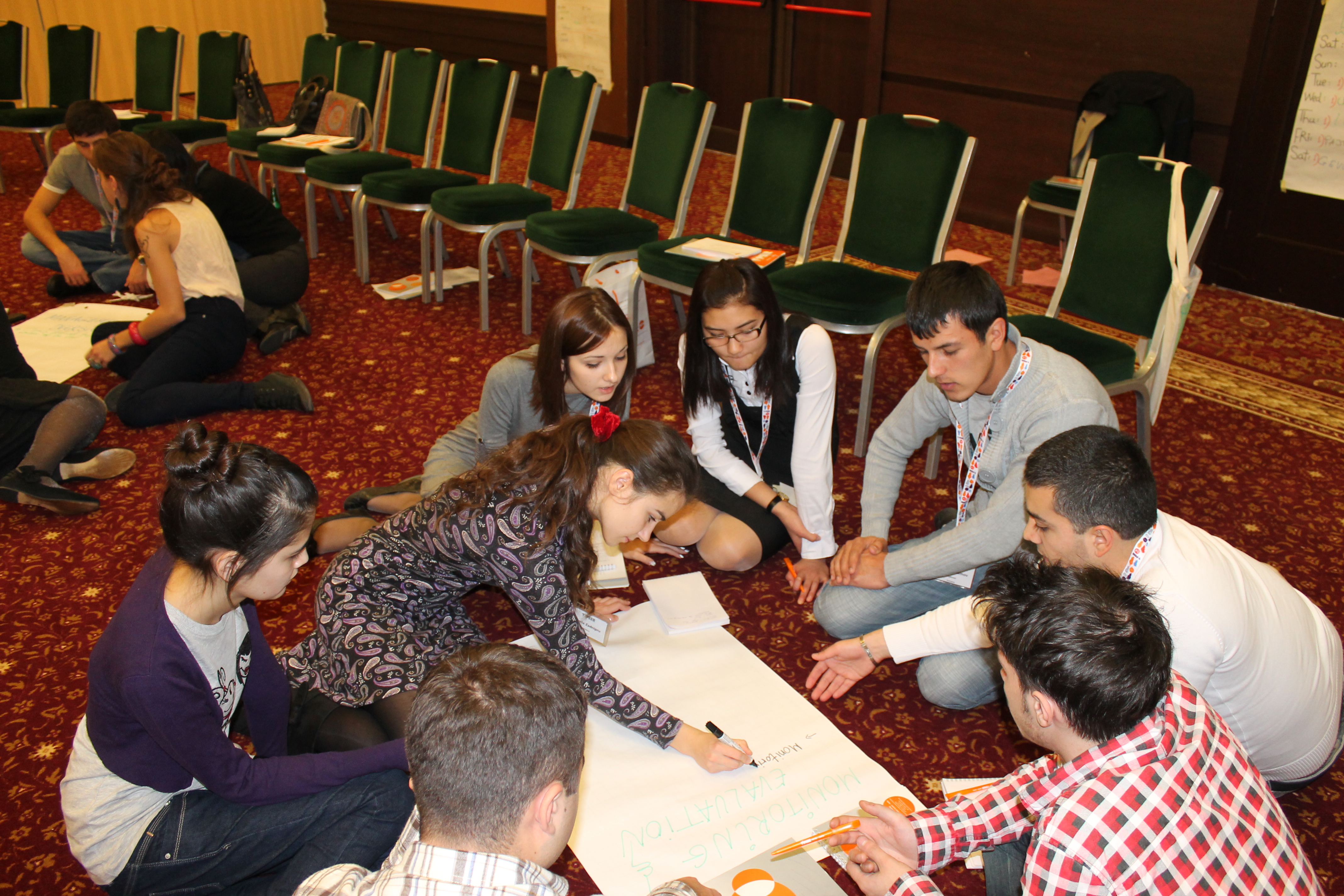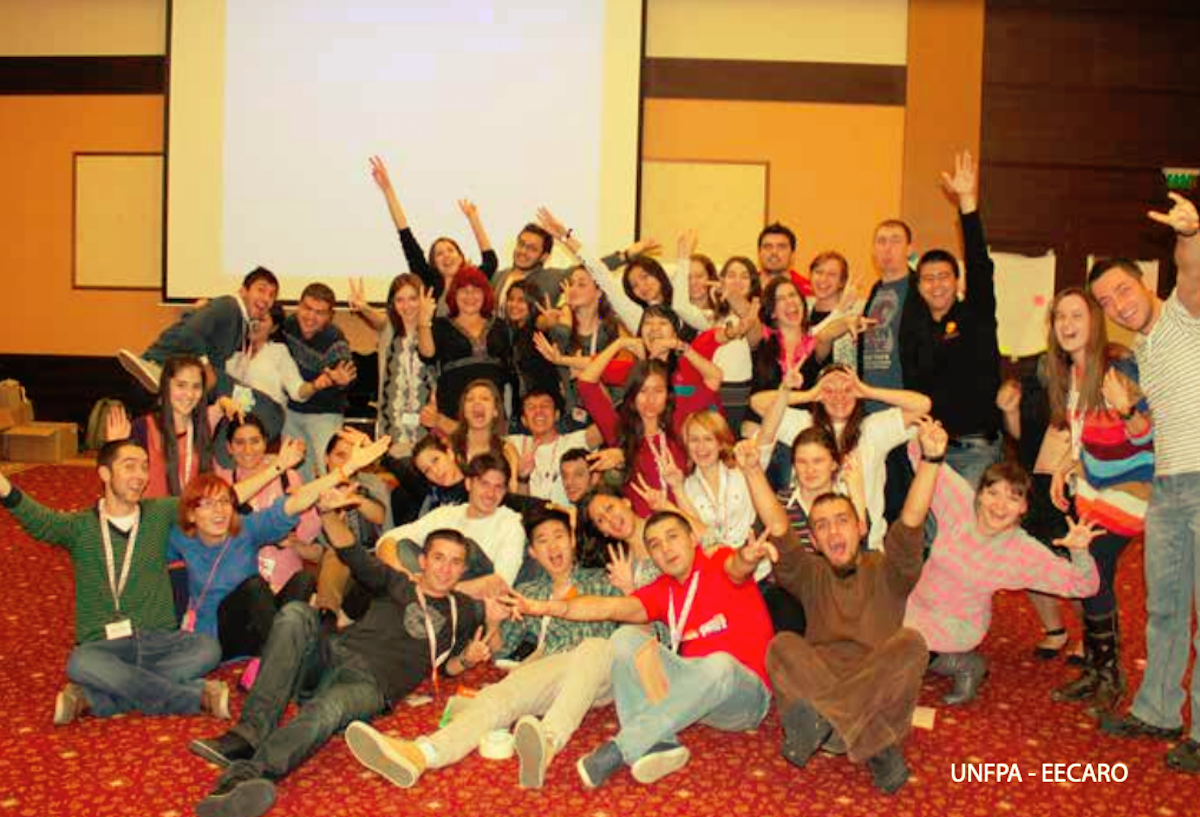 Empowering and Building the Capacity of Young People
Youth empowerment for sustainable development
Empowering and Building the Capacity of Young People
Youth empowerment for sustainable development

Challenges
The 2030 Agenda is committed to investing in youth and underscores their rights and the need to capitalize on their potential to contribute to positive social transformation. In line with the Programme of Action of the International Conference on Population and Development, countries in Eastern Europe and Central Asia recognize that the effective realization of sexual and reproductive health and reproductive rights requires the empowerment of all sectors of society, including adolescents (ages 10-19) and youth (ages 15-24). Efforts to strengthen national commitments to invest in young people (ages of 10 and 24) by building and enhancing their capacities will enable them not only to exercise autonomy and choice with regards to their well-being but also play a vital role in their communities and contribute to the sustainable development agenda.
Towards a Solution
UNFPA, in partnership with National Center of Public Health and Analyses in the Ministry of Health of Bulgaria and youth organizations, launched various initiatives that support youth capacity development and empowerment in the areas of sexual and reproductive health and rights, gender equality and peacebuilding in Eastern Europe and Central Asia and beyond. The overarching goal was to inspire and support adolescents and young people to become leaders through innovative approaches and cooperation.
The Peer Education, Training and Research Institute (PETRI), based in Bulgaria’s capital city, Sofia, serves as a facilitator for exchanging knowledge, sharing resources, encouraging the advocacy efforts of young people and providing solutions with the help of a network of partners. It builds and maintains a regional network of organizations and individuals who implement and design programmes for successful improvement of youth knowledge, attitude and skills. PETRI-Sofia links beneficiary needs in knowledge, capacities, programme development and implementation to the expertise and know-how existing in the region, including the expertise of young people.
PETRI-Sofia uses peer-to-peer education through alternative methods of education, such as theatre-based techniques, role games and simulations. The target audience for its training programmes include trainers, students and youth aged 18 to 30. It has ‘fellows’ from an international network of young volunteers in 57 countries in four regions (Asia-Pacific, Eastern Europe and Central Asia, East Africa, Middle East and North Africa) and also partners with government institutions.
More than 500 young people were trained by PETRI-Sofia in Bulgaria on topics relating to sexual and reproductive health and rights, advocacy, project development and management, leadership, fundraising and resource mobilization, among others.
PETRI-Sofia shared its experience with a counterpart in Amman, Jordan where a similar Regional Knowledge Hub for Youth Development was set up with support from the National Centre for Culture and Arts of the King Hussein Foundation.
Emerging youth leaders and innovative thinkers from 21 countries took part in the PETRI international fellowship programme that provided an opportunity and space for young activists to develop their skills and knowledge, to meet their peers from different countries, exchange and share ideas and experiences, network, plan future activities and work in a multicultural environment.
The PETRI-Sofia Training on Advocating for Youth Voices and Priorities in Eastern Europe and Central Asia Region mobilized young people to raise their voices and advocate for their priorities related to the post-2015 agenda. In 2016, PETRI-Sofia organized training aimed at building the capacity of youth leaders from the region as “Trainers of Trainers” in peer education to plan and lead training sessions for their peers and to use theatre techniques related to sexual and reproductive health and rights and HIV prevention.
In 2017, with the support of the Ministry of Foreign Affairs, a “Youth Leadership for the Development and Implementation of the Sustainable Development Goals (SDGs)” project was launched, to develop the capacity of young people to contribute to the achievement of the SDGs.
As a regional resource centre and knowledge hub for youth, PETRI-Sofia is a good example of an effective facilitator for exchanging knowledge and experiences and sharing resources and in building the capacity of young people for leadership, among other skills. The training of young people, including training of trainers, increased the number of highly skilled youth in the region to, among other things, plan and implement a wide spectrum of youth sexual and reproductive health and HIV prevention related activities. Critical to its success is the commitment of national institutions that guarantee its sustainability and the support of international development agencies and a network of youth-led partners.
Contact Information
Countries involved
Supported by
Implementing Entities
Project Status
Project Period
Primary SDG
Secondary SDGs
Similar Solutions
| NAME OF SOLUTION | Countries | SDG | Project Status | |
|---|---|---|---|---|
A Billion Brains: Smarter Children, Healthier Economies High Level Meeting on South-South Cooperation for Child Rights |
Bulgaria, Jordan | 17 - Partnerships for the Goals | Completed | View Details |
Accelerating the Implementation of African Union Treaties in São Tomé and Príncipe South-South learning from the Beninese judicial system’s experience in the application of human rights treaties to its national law |
Bulgaria, Jordan | 05 - Gender Equality | Completed | View Details |
Accelerating the Transformational Shift to a Low-Carbon Economy in Mauritius Towards supplying 35 percent of the country’s energy needs with renewables by 2025 |
Bulgaria, Jordan | 05 - Gender Equality 09 - Industry, Innovation and Infrastructure 13 - Climate Action | Ongoing | View Details |
Accelerator Labs Network Following collective intelligence methods to address emerging sustainability challenges and the growing demand for local solutions |
Bulgaria, Jordan | 08 - Decent Work and Economic Growth 13 - Climate Action | Ongoing | View Details |
Accessibility of Financial Services and the Private Sector in Africa Maximizing the impact of financial cooperation on economic development and industrialization in Africa |
Bulgaria, Jordan | 08 - Decent Work and Economic Growth | Completed | View Details |

